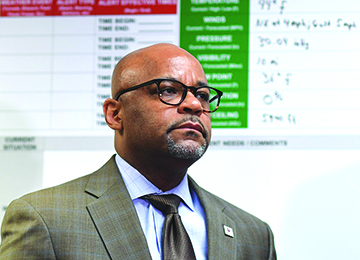
Mayor Hancock Gets Badly Mauled In Denver Ballot Measures
As a result of a bevy of Denver ballot issues, the November election was consequential for the future of Denver although the election as it relates to Denver got relatively little attention. First and foremost, the strong mayor form of government first adopted in 1904 when Denver became the City and County of Denver is for all intents and purposes badly damaged. Michael Hancock has been easily elected three times as mayor of the Mile High City but appears to be nonetheless widely despised by his Denver constituents as the election demonstrated.

The powers taken from the mayor’s office and given to the City Council are not small or inconsequential as generally reported in the Denver press and they are just the beginning.
First, in Ballot Measure 2E, backed by Councilwoman Amanda Sawyer, the voters removed the mayor’s ability to hire people for a number of important positions including the chief of police, sheriff, fire chief, city attorney, public health director, parks director, aviation director and the planning and development manager. The mayor would still select and oversee those appointees. Incumbent appointees serving when a new mayor is sworn in would still be subject to approval. Hancock argued against the proposal saying it would make it much more difficult to recruit qualified people. Nobody seemed to care. Few were overly impressed by his hires in the first place. Before, people in those positions could simply ignore the City Council and the public in general and only had to do the mayor’s bidding. No more.
Next in Ballot Measure 2G the voters took away the mayor’s unfettered control over the city budget. The mayor’s office prepares the budget and if the City Council alters it in any manner, he can use his veto power and it takes a super majority (9 out 13) to override the veto. Only the mayor could initiate any changes during the year. Councilwoman Robin Kniech saw an opening and pushed a charter change allowing the Council to appropriate new or excess revenues and transfer unspent money throughout the city. It’s now a new ball game.

Hancock not only strenuously opposed 2E and 2G, he even trotted out the old war horse, former Mayor Wellington Webb (along with Webb’s wife Wilma), to lead the opposition to the changes but no avail, both passed relatively easily.
But the City Council was not done hacking away at Hancock. Councilwoman Debbie Ortega pushed Ballot Measure 2C which the voters approved giving the Council the right to hire their own professionals including attorneys without the need to rely on Administration officials who at least used to be solely dependent on the mayor. This may sound insignificant, but it is not. Fights like the one over Hancock sexually harassing female employees will no longer be one sided affairs with the mayor holding all the cards.
Denver citizens had become sick and tired of Hancock and his developer cronies totally ignoring transportation issues. For massive development projects the administration would not even do traffic studies on the effect of the development because it might come out negative. In 2019 the voters approved a charter change which turned the Department of Public Works into the Department of Transportation and Infrastructure (DOTI) effective January 1, 2020. Hancock in response, using his executive power created Multimodal, Pedestrian and Bicycle advisory committees which he of course appointed all of the members. Councilwoman Ortega decided that was a bad idea so she proposed another charter change Ballot Measure 2D whereby there would be a DOTI Advisory Committee comprised of 19 individuals of which the mayor would be able to appoint only six members while the City Council would have the ability to appoint the remaining 13. The voters also liked that idea although it is unclear what, if any, powers the advisory committee would have.
The final insult to the mayor was Ballot Measure 2J. In 1989 Denver adopted a pit bull ban. Earlier this year, the Council revoked the ban, but Hancock vetoed the measure and there were not enough votes to override the veto. Councilman Chris Herndon refused to concede defeat and had the Council refer the matter to the voters who backed Herndon and pit bulls over Hancock.
In the end the Council and the members who oppose Hancock won every measure and Hancock lost every last one. The general commentary has been that Hancock and the mayor’s office had its sails trimmed back, but no big deal. They say Hancock did not try very hard, but of course, he never tries very hard at anything. A weak mayor, Michael Hancock has effectively begun the destruction of Denver’s strong mayor form of government. Given its amazing victories, the City Council will be back in the next election to do some more sail trimming.
We agree with the City Council members who fight the mayor and the voters who gave Hancock a political spanking. When a character like Michael Hancock uses three terms as mayor and all the powers the City Charter gives him to reward and line the pockets of the high-density developers who controlled him, it was time to change the Charter. Hancock has almost three more years to continue to destroy a once beautiful city. Hopefully, he will spend that time to continue to chase women, but the high-density developers are not likely to rest until they have exploited every last dollar destroying a wonderful city that past mayors help build.
— Editorial Board



